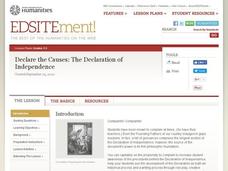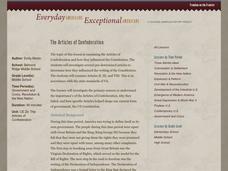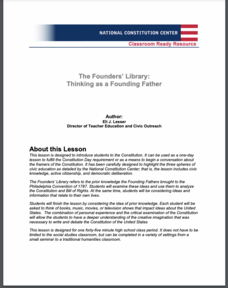Benjamin Franklin Tercentenary
Benjamin Franklin: Master Diplomat for One Last Time
At 81, Benjamin Franklin was the oldest delegate to the 1787 Constitutional Convention, where he exercised significant influence in shaping key elements of how the United States operates. The class examines his role, using “The Scene at...
National Endowment for the Humanities
Lesson 4 James Madison: Internal Improvements Balancing Act—Federal/State and Executive/Legislative
Who has the power? The founding fathers asked the same question when the United States was formed. Learners explore issues that arose during Madison’s presidency that raised constitutional questions. Through discovery, discussion, and...
Curated OER
Learning the Blues
Learners take a virtual field trip to Memphis, Tennessee in their study of the blues, its characterisitics, founding fathers, and histororical influence on modern music. They compose blues lyrics that reflect present-day attitudes and...
Curated OER
Declare the Causes: The Declaration of Independence
Young scholars study the Declaration of Independence and the process our founding fathers went through to get it written and signed. They analyze other similar historical documents and draft and present their own declarations.
Curated OER
Why A Bill of Rights?
Examine conflicting viewpoints in this lesson, in which middle schoolers write their own proposal for including a Bill of Rights in the Constitution. As a class, they discover how the Bill of Rights was not a planned document to be...
What So Proudly We Hail
Life, Liberty, and the Pursuit of Happiness: A Lesson on the Declaration of Independence
What does it mean to say that a right is unalienable? How did the founding fathers convey this revolutionary concept in the Declaration of Independence? Engage in a close reading and analysis of the Declaration of Independence, and...
Curated OER
What is Meant by Returning to Fundamental Principles?
What did the Founding Fathers mean by the importance of continually returning to fundamental principles? Your young historians will analyze a series of quotations illustrating the fundamental ideals and principles of the United States...
Ashbrook Center at Ashland University
The Constitutional Convention
Imagine sitting down with representatives of your school to write a new student handbook. What arguments would ensue? How would compromises be made to finish the project? Scholars research the Constitutional Convention using a directory...
National Endowment for the Humanities
The Declaration of Independence in Six Parts
Everyone knows that the Declaration of Independence is important, but what does it actually say? Members of American history classes analyze the Founding Fathers' arguments against British tyranny and for a more perfect union with a...
Judicial Branch of California
Protecting our Freedoms: The Bill of Rights
Take to the stage! Integrate both drama and civic skills by asking pupils to create and perform skills that demonstrate the importance of the amendments in the Bill of Rights. After reviewing the Preamble to the Constitution, learners...
PBS
Amid Rising Economic Inequality, Does America Need a Third Reconstruction?
Young political scientists investigate the Poor People's Campaign protest held in Washington, D.C., on June 18, 2022. They research how the event was reported in various news outlets and consider their stance on whether "poverty is...
Curated OER
Benjamin Franklin
In this Benjamin Franklin instructional activity, students read a 1 page article on Benjamin Franklin, answer 3 questions with multiple choice answers, fill in 4 blanks to complete 4 facts and answer 2 statements as true or false.
Curated OER
The Pilgrim Fathers
In this "Pilgrim Fathers" study guide worksheet, students read about ;the beginning of colonization in the American East. Students read 3 sections of information.
Curated OER
Max Found Two Sticks Vocabulary
In this Max Found Two Sticks vocabulary activity worksheet, learners complete 7 sentences using the 7 vocabulary words provided in the word bank.
Curated OER
Papa's Got A Brand New Bag
Learners design and promote technological devices for Father's Day gifts that reflect evolving social trends. They consider the new image of dads cast by today's media and advertisements and its influence.
Curated OER
We the People... How Does Government Secure Natural Rights?
Students investigate the Founders' ideas about what kind of government is most likely to protect the basic rights of people. They distinguish between limited and unlimited government.
Curated OER
Worksheet #49 - Constitution
In this historical quiz worksheet, students test their knowledge on multiple historical references about the Constitution as they answer the ten fill in the blank questions.
Roy Rosenzweig Center for History and New Media
The Articles of Confederation
Have you ever started a project only to realize you need to scrap it and start over? Scholars analyze the issues leading to the fall of the Articles of Confederation. A group investigation into Articles II, III, and VIII unveil the...
Curated OER
The Founders’ Library: Thinking as a Founding Father
Students analyze the U.S. Constitution and the Bill of Rights. In this U.S. government lesson, students examine books, movies, and music that influence them today and then investigate writings that influenced the framers of the...
Benjamin Franklin Tercentenary
What Ben Read
Just what did Ben Franklin read? By juxtaposing Ben Franklin’s reading material as a young man with an analysis of his developed ideas, learners gain the opportunity to see how the influences of his youthful reading played out. Roman,...
Curated OER
The Federalist Papers (1787-1789)
An online interactive history quiz awaits your eager upper graders. They respond to 50 multiple choice questions about the Federalist Papers, and then submit their answers to be scored. While the quiz covers some pertinent information,...
Curated OER
Hebrews
When learning about other countries, societies, and people, it helps to understand what they believe and what they think is important. This is a quick and basic overview of Hebrew or Jewish beliefs. It covers basic symbolism, founding...
National Endowment for the Humanities
Creating the Office of the Presidency
The United States needed an executive power, but it wanted to avoid a monarchy. Using James Madison's notes on the Constitutional Convention, young historians look at the juggling act the Founding Fathers did to create a role for the...
Curated OER
U.s. Constitution Roll Call Test
Students act as newspaper reporters from 1787 and interview some of the signers of the Constitution. They study the contributions of these Founding Fathers: Washington, Franklin, Madison, Hamilton and discuss the purpose of the U.S....
Other popular searches
- Our Founding Fathers
- Founding Fathers Game
- The Founding Fathers
- Bible and Founding Fathers
- Founding Fathers Project
- Founding Fathers Debate
- Founding Fathers Art
- Founding Fathers Fame
- Founding Fathers Gfame
- Founding Fathers Ideals
- Founding Fathers of Us

























